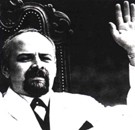 | | Uncompromising film |
Enfant Terrible of the Czech New Wave
Jan Němec's 1960s films
Peter Hames
In the 1960s, Czech cinema gave birth to an astonishing sequence of films that included such classics as Obchod na korze (A Shop on the High Street, 1965), Ostře sledované vlaky (Closely Observed Trains, 1966), Hoří, má panenko (The Firemen's Ball, 1967), Sedmikrásky (Daisies, 1966), Všichní dobří rodáci (All My Good Countrymen, 1968), and Žert (The Joke, 1968).
Jan Němec was often considered the most talented of the directors, and he was certainly one of those least given to compromise. Interest in his work is now increasing, and, indeed, this week in London a sequence of films devoted to the writer and designer, Ester Krumbachová, will also pay homage to the director, with screenings of his three most famous 1960s works, Démanty noci (Diamonds of the Night, 1964), O slavnosti a hostech (The Party and the Guests, 1966) and Mučedníci lásky (Martyrs of Love, 1966). [1]
While it is evident from both the student and feature films of his contemporaries that experimentation was in no way exceptional, Němec made it clear that he had no desire to make "realist," or what we would now call "classical narrative," films. "If, from the first scene," he said, " it is apparent that any superficial resemblance to reality is not important at all, the audience will give up their favourite comparisons and concentrate on what the director really tries to convey."
A similar approach can be detected in his post-Communist films, such as the adaptation of Ladislav Klíma's novel Utrpení knížete Sternenhocha (The Sufferings of Prince Sternenhoch), re-titled V žáru královské lásky (The Flames of Royal Love, 1990), influenced by the style of contemporary rock opera, as well as his reflections on alchemy and politics in Jméno kódu Rubín (Code Name Ruby, 1996), a film dedicated to Krumbachová. (See Ivana Košuličová's article in this week's CER for more on Němec's post-1989 works).
Holocaust and hallucinations
While at FAMU (the Prague Film School), Němec studied under the director Václav Krška, whose Měsíc nad řekou (Moon over the River, 1953), adapted from the play by Fráňa Šrámek, Němec regarded as the first Czech "auteur" film. Němec's short graduation film, Sousto (A Loaf of Bread, 1960), an adaptation of Arnošt Lustig's story about two prisoners who steal a loaf of bread from a freight car guarded by the SS, won three international awards.
Lustig's stories and novels about the Jewish experience in Nazi concentration camps were to form the basis of some of the major Czech films of the sixties, of which Němec's first feature, Démanty noci, is the most impressive. It was adapted from Lustig's novella, Tmá nemá stín (Darkness Casts No Shadow). [2]
The story of the film is very simple. Two Jewish boys escape from a Nazi
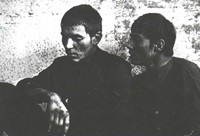 | | Nightmares and daydreams | transport train, stagger through the woods, ask for food at a farmhouse, then are betrayed and captured by the local Sudeten volunteers. The boys are put on trial and condemned to death, but they may or may not be executed. This is not, however, a conventional "open ending" since the audience is given two endings. A choice must be made.
The film's main narrative device centres on a pair of boots which has been exchanged for bread on the train. It is because of the ill-fitting boots that they will be captured. A close-up of the mud-caked boots leads to an immediate flashback to them in the railcar among emaciated camp members. It is the first of a series of close-ups that provide a potent evocation of increasing lameness. In repeated images, we see boots painfully eased off, the bruised feet painfully unwrapped or prodded.
Film sensation
Unlike other films based on Lustig's writing, Němec's film constantly breaks with conventional narrative and psychological motivation. He is not interested in telling a story or explaining the actions of his characters, but in making a close identification with their mental state. The novella, of course, also employs a flashback structure, but it is conventionally motivated.
Němec's objective can best be described as a search for psychological truth. Recognising the debilitated state of his heroes, he places intense emphasis on
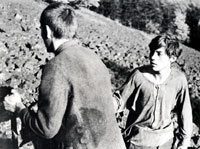 | | In search of psychological truth | the interaction between physical sensation and mental states. Němec walks a tightrope between the two, conveying flashbacks and fantasy in a continuum in which past, present and future comprise a single reality. The hand-held camera is placed so close to the action that it is virtually a third participant in the flight. In an exhausted and semi-feverish state, the boys push on as memories and fantasies break into their consciousness.
Rarely attempted in cinema—Démanty noci is one of the few examples—this is an entirely logical, even "realist", approach. The focus on physical sensation is conveyed through texture, lighting, and sound-harsh sunlight on jagged rocks, ants filling the socket of an eye, the sound of rain soaking into the earth, a bubble of blood in a dry mouth, a fantasy scene of childish laughter on crisp winter air.
Němec's admiration for the Spanish surrealist Luis Buñuel is evident in this work, with obvious influences from Un Chien Andalou (An Andalusian Dog, 1928) and L'Âge d'Or (The Golden Age, 1930). However, these are no mere quotations and are embedded in Němec's own approach.
Like many of the adaptations of Lustig's work, Němec's film expands from its
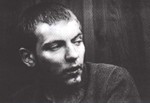 | | Symbolic points of reference | historical context to emphasise a symbolic relevance, an application to other situations and times. The struggle against persecution and injustice is a permanent one, and the film seems more concerned with the fact and experience of persecution than an analysis of its historical context. The final image in which the heroes appear to march on into the woods suggests an unresolved situation.
The film draws on the photographic talents of both the established cinematographer Jaroslav Kučera and the young Miroslav Ondříček, who also worked as assistant cameraman to Kučera on three other features. Ondříček, who photographed a third of the film (this was before his collaboration with Miloš Forman), was responsible for the remarkable use of hand-held camera. Kučera's flair for photographic texture, evident in such films as Vojtěch Jasný's Všichní dobří rodáci (All My Good Countrymen, 1968) and Věra Chytilová's Ovoce stromů rajských jíme (The Fruit of Paradise, 1969) is also apparent.
Němec again worked with Kučera on the Czech New Wave's manifesto, the five-director adaptation of stories from Bohumil Hrabal's Perličky na dně (Pearls of the Deep, 1965). In the episode "Podvodníci" (Impostors), he examines the situation of two old men on the brink of death, who construct artificial pasts. One claims to have been a famous opera singer, the other a successful journalist. But Němec, the "auteur," allows Hrabal's characters and dialogue to dominate, and maintains a respectful distance from the two boastful old men.
Everything going unexpectedly to plan
Němec once said, "When one lives in a society that is essentially not free, it is the obligation of every thinking person to attack obstacles to freedom in every way at his disposal..." With his next film, O slavnosti a hostech, he made what would prove to be one of the most politically controversial films of the sixties.
The film is based on a novella by Ester Krumbachová, who had first worked
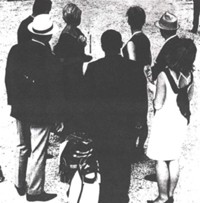 | | A Krumbachová collaboration | with Němec as costume designer and uncredited story editor on Démanty noci, writing her first screenplay with Zbyněk Brynych for ...a pátý jezdec je Strach ( The Fifth Horseman is Fear) the same year. Němec and Krumbachová married (to prevent the confiscation of her flat) and worked together on his next two films.
The story was originally written with no plan (or hope) of publication when Němec suggested that it would make a good film. They went through four or five drafts before arriving at the final screenplay, which they thought couldn't be made. And yet it was. In fact, it was filmed without changes, shot over a five-week period on a very low budget.
Němec points out that his name was quite marketable at the time. Démanty noci had won awards at international festivals and achieved foreign sales; therefore, it was viewed favourably by the government. On the other hand, he notes, O slavnosti a hostech could never have been made without the protection of writer and production group head Jan Procházka.
Totalitarianism by the lake
The film describes what happens when a group of "guests," who have been invited to a lakeside party, find themselves surrounded by thugs and then
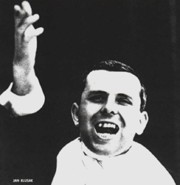 | | Jan Klusák as a guest | taken to a forest clearing and interrogated. Although they initially wonder about the identity of these additional guests, it is soon apparent that these are members of the secret police and that Rudolf, the apparently imbecilic interrogator, is their leader. When one of the group, Karel, steps out of the circle in the gravel to which they have been symbolically confined, he is pursued and roughed up.
At this point their host appears, making admonitory noises to "the boys" and conciliatory overtures to the "guests." He leads them to a lakeside banquet, where their places are interspersed with those of the police. However, it soon transpires that one of the guests has disappeared. "He did not want to be here at the party," says his wife.
After some prevarication, it is decided that he should be hunted down and persuaded to return and, for added efficiency, they will take a gun and a fierce dog. The original guests remain behind at the banquet, where they douse the candles as an economy measure. The screen turns black and the snarling of a dog is heard amplified.
The professional identities of the seven guests remain somewhat obscure, but they all appear to be "middle class" (ie they are well-dressed and materially ambitious). Josef (Jíří Němec) organises the rest of the group during the interrogation, to comply with the police documents. He assumes a seat at the right hand of the host and is entrusted with a speech suggesting that they should hunt down the missing guest. Several references in his dialogue suggest that he may come from a legal background.
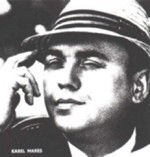 | | Karel Mareš: Principled stand | Karel (Karel Mareš), the only guest to complain, is roughed up and has the fringes of his carrier bag cut off. However, his principled protest is easily assuaged by an apology and the return of his cigarette lighter. František (Pavel Bošek), an altogether less obvious character, speaks of "complaining later" and owning a new house. He also speaks to the host about "special favours."
The escaped guest (Evald Schorm), apart from ritual agreement with his wife's platitudes about the landscape, says nothing (especially when everyone claims to be a democrat).
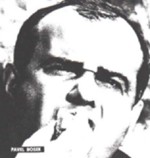 | | Pavel Bošek: Special favours | In a world in which words and actions have lost their meaning, silence appears to be the only possible response from the man of principle. His wife (Jana Prachařová) seems mainly preoccupied with consumer comforts, a desire to adapt, be reasonable and not rock the boat. She is worried about the collective pursuit of her husband, since he is wearing his new suit. "Women have so much to forget," observes the host. The other two women, the flirtatious Eva (Zdena Škvorecká) and the scatterbrained Marta (Helena Pejšková), are more than willing to adapt.
Thinly veiled attack?
A host who is clearly a political leader and somewhat resembles Lenin, a dissident who runs away, a wife who remains a hostage, a society underpinned and ultimately structured by the role of the secret police. Surely this can only be Czechoslovakia under Communism? Yet, as Němec points out, the resemblance to Lenin was accidental and, even today, he denies that it was a film directed at the government.
It is, he says, as relevant today as it was then; it is about both
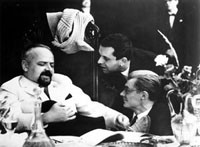 | | A dictatorial Lenin lookalike | governmental and institutional power. It is about the guests and the ways in which they accommodate their lives and their views to the dominant power and ideology. Ultimately, it is the people who create the system of which they are apparently the victims. Thus, Němec is not happy that the film has been viewed merely as a veiled attack on the government.
Parallels have been drawn between O slavnosti a hostech and Buñuel's El Angel Exterminador (The Exterminating Angel, 1962), in which a group of guests find themselves unable to leave a house as a result of their own inertia. The easy adaptability of Němec's heroes could also be linked to the heroes of Buñuel's Le charme discret de la bourgeoisie (The Discreet Charm of the Bourgeoisie, 1972). However, Němec had not seen the first film and the second came later. Although there were no direct influences upon this work, Němec is clearly happy with the film being placed in the company of Buñuel's work.
Other potential influences could include "the theatre of the absurd." In the mid-sixties, both Eugène Ionesco and Samuel Beckett were produced on the Prague stage, as were the first plays of Václav Havel and Josef Topol. The film's dialogue is apparently endless and consists principally of disconnected sentences. Krumbachová said, "I tried not to mimic real speech but to suggest its pattern, to find a language for the sort of phenomenon that Ionesco discovered in drama." Unlike Ionesco, she argued that she tried to use paradoxes and absurdities to depict her characters, but did not regard the world itself as absurd. Josef Škvorecký referred to the effect as representing "a strange deafness, an appalling apathy and a peculiar alienation."
Despite the emphasis on dialogue, images still play a central role. "In the past," observed Krumbachová, "heroes used words to describe tragic situations. Now, tragedy is revealed by pictures, and our words have no relationship to what we see."
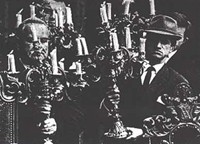 | | Menacing banquet | The images were inspired by the photojournalism of Henri Cartier-Bresson, Goya's Caprichos and press photographs including, for instance, images based on the Vietnam War or John F Kennedy. The banquet itself was constructed on the model of Nobel Prize dinners, but every chair was different (a point referred to in the dialogue). The intention was to render the images familiar without relating them to any specific historical situation.
And yet, when President Novotný saw the film, he apparently "climbed the walls" (almost literally, according to Němec) and demanded the arrest of the
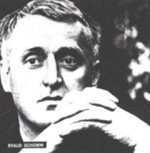 | Evald Schorm:
Guest with everyday courage | director. He apparently interpreted the film as a commentary on the banning of Evald Schorm's film Každý den odvahu ( Everyday Courage, 1964). More likely, the film presented an all too recognisable portrait of society and, although Němec insists that he was not attacking the government, his cast, drawn principally from the Prague intelligentsia, contained no-one who supported it.
Apart from Ivan Vyskočil, who played the host, the cast was made up of non-actors, including, for example, Jiří Němec, a psychologist and later a Charter 77 spokesperson, composers such as Karel Mareš and Jan Klusák (who played Rudolf, the head of the police) and film director Evald Schorm, who was identified both personally and through his films as someone of moral integrity. The cast also included the novelist Josef Škvorecký and his wife Zdena Salivarová-Škvorecká, who were later to emigrate to Canada, and Dana Němcová, who was also to become a Charter 77 spokesperson. It was a virtual photo album of "counter revolution," says Němec-only Havel was missing.
A filmgoer reminisces
Němec escaped the threat of jail (although the film was banned until the Prague Spring of 1968) and rapidly began another film, for fear that he might not be allowed to complete it. Mučedníci lásky was completely non-political, although it was condemned as incomprehensible. It was a tribute to the chanson, or popular song, in which, said Němec, "the most serious things are sung about in a light-hearted, cheerful and even sentimental manner." Škvorecký has linked the film to the twenties tradition of Poetism in which poetry was sought in the manifestations of popular culture.
The film consists of three "gloomy farces": "Pokušení manipulanta" (The Temptations of a White Collar Worker), "Nastěnčiny sny" (Nastěnka's
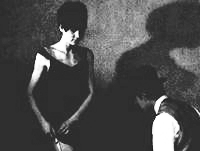 | | Gloomy reveries | Reveries) and "Dobrodružství sirotka Rudolfa" (Orphan Rudolf's Adventure). In the first, the hero saves up his money, dreams of romance, spends an evening on the town, meets a girl and returns to the cold dawn of everyday life.
In the second story, Nastěnka, a waitress, dreams of marrying a famous or wealthy man. She is obsessed with a pop star (Karel Gott) before departing with an army doctor (Jan Klusák), finally escaping to a passing train and ending up with a middle-aged traveller. In the third episode, an orphan is welcomed to a party at a large house and falls in love. But, after returning to work, he is unable to rediscover the house where he had found happiness.
Němec said that the film could have been subtitled "From the reminiscences of a filmgoer," as it certainly evokes the world of silent cinema and slapstick comedy. Yet, apart from the Chaplinesque attire of the white-collar worker, the influences are almost subliminal-recognisable but unable to be placed.
If O slavnosti a hostech became a collective representation of the
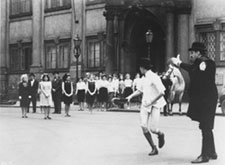 | | The Chaplin influence? | Prague intelligentsia, Mučedníci lásky paid tribute to the world of popular music that was one of the manifestations of the sixties cultural revival, with music written by Karel Mareš and Jan Klusák. The voices of Marta Kubišová, Eva Olmerová and Karel Gott play a dominant role in the creation of the film's emotional mood. The film also features jazz musicians Jan Hammer and Miroslav Vitouš, both of whom were to establish international reputations in their years of exile after 1968. (Hammer, in fact, would later compose the music for Němec's V žáru královské lásky and Jméno kódu Rubín).
A change of visual style
After the sombre and controlled visual style of O slavnosti a hostech, where the photography was by Jaromír Šofr, Němec moves here to a mood of sad lyricism, in which the cinematography of Miroslav Ondříček is a key factor. In the first episode, the hero alternates his erotic imaginings with views of life in other apartments as seen through his window. He sees the legs of dancers, struggling bodies on a bed, an old couple gazing through net curtains, the silhouette of a girl, a baby and a woman washing her hair. The night gives these banal images a wistful sadness, thereby achieving a strange kind of poetry.
In addition to Ondříček's photography there is, of course, Krumbachová's costume design, a major contribution to so many of the films on which she
worked. While the visual style of the film vaguely indicates the inter-war years, it is set at no particular time. If the film's music comes from the sixties, it also is designed to evoke a lost world of imagination and feeling. Like O slavnosti a hostech, the film is familiar, yet detached from the reassurances of place or time.
As a disciple of the film-maker's personal style, it is surprising how much Němec's sixties films differ, although they all reject conventional narrative form. The obvious explanation might be the role of Krumbachová in the second two, but Mučedníci lásky is also very different from O slavnosti a hostech.
The film critic's search for continuity and creative responsibility may not be appropriate to some of the forms of "free" collaboration apparent in some of the New Wave films. Although Krumbachová directed only one film (Vražda ing. Čerta / The Murder of Engineer Devil, 1970), Miloš Forman once described her as the best director he knew. Michal Bregant's description of her at Karlovy Vary's 1992 tribute is surely the most apt: "...she was the charming conscience and supporter of a generation of film makers. Film directors would turn to her and she would generously bestow ideas and inspiration." But the films are, above all, a testament to their time-unforeseeable and unrepeatable.
Stolen hearts, stolen screenplays
Němec's film-making in the sixties did not end there. In 1967, he made the short film Mutter und Sohn (Mother and Son)in the Netherlands, which won the Grand Prix at Oberhausen. Made without the approval of the authorities, it did nothing to improve his standing. A series of short films featuring Marta Kubišová were made for television and released as the feature Náhrdelník melancholie (A Necklace of Melancholy) in 1968.
Then, of course, in the same year came Strahovská demonstrace (The Strahov Demonstration), an analysis of the student demonstrations of 1967 and Oratorium pro Prahu (Oratorio for Prague), a record of the Warsaw Pact invasion. Both were banned.
The second had begun as a documentary portraying Czechoslovakia in 1968. Josef Škvorecký was to write the commentary. By the time he saw the film in Paris, it had completely changed its form:
Tanks smashed into the idyllic counterpoints. Next to the dancing Smrkovský lay a boy shot by a machine-gun. Next to a priest raising a chalice stood two boys with a bloodied flag. Next to Dubček waving to the crowds, a Soviet political officer waved his revolver at the crowds from a tank turret. One of the cameramen who had made the film was, at that time, lying in a hospital with his jaw shot off. [3]
It was Oratorium pro Prahu that provided the news footage for Western television stations, and it was later used in the Hollywood adaptation of Milan Kundera's The Unbearable Lightness of Being (1987) for which Němec was an advisor. The two films marked the end of Němec's career as a film maker in Czechoslovakia until the fall of Communism in 1989. No longer available on film, Oratorium pro Prahu exists on video in the USA. [4]
 | | Havel and Němec | Silenced and identified as someone who should never be allowed to make a film again even if he were to sign the appropriate documents of contrition, Němec finally gained permission to emigrate in 1974. After he had boarded an Air France plane, which prepared for take off, two men with machine guns appeared and forced a return to the departure gate. Taken from the plane, he was interrogated and his luggage, which contained several screenplays, was confiscated. Among the screenplays taken was Václav Havel's "Heartbeat." However, Havel's screenplay may not be completely kept from the screen by this confiscation, as Němec hopes to partially use material from "Heartbeat" in his next film project.
Peter Hames, 14 May 2001
Peter Hames is currently preparing a book on Němec's O slavnosti a hostech, due to be published in 2002 by Flicks Books in the Cinetek series.
Moving on:
Footnotes:
1. For more details of the Ester Krumbachová season taking place in London (and, indeed, other Czech cultural events in the UK), see the London Czech Centre's website.
2. Arnošt Lustig's writings are available in English translation from Amazon.co.uk:
These books have been published in the USA but are listed by Amazon.com as being out of print.
3. Josef Škvorecký, All the Bright Young Men and Women, Peter Martin Associates, 1971.
4. A dubbed version of Oratorium pro Prahu can be bought on VHS from Amazon.com in NTSC format. Click here for more details.
|


















